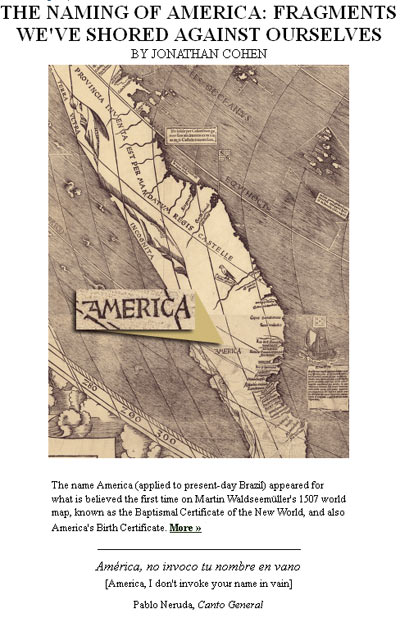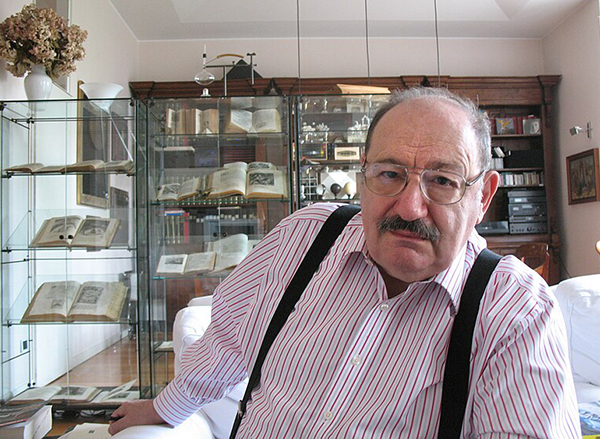The name America is widely believed to derive from Amerigo (Americus in Latin) Vespucci, a contemporary and eventual friend of Christopher Columbus who not only explored unknown regions of the “New World” but who also invented a system of computing exact longitude and arrived at a figure computing the earth’s equational circumference only fifty miles short of the correct measurement. Quite a feat in the early 16th century!
While no one knows for sure where it came from, the first documented use of the name America was in 1507, when Martin Waldseemüller produced a world map on which he named the new continent America after Vespucci’s first name, Amerigo. More on this fascinating story can be found here: http://www.uhmc.sunysb.edu/surgery/america.html.
Tracing the etymology of Americus, I found the Middle English “yreke”, where its context was something like “as if to rake up the dying embers and thereby release a flame.”
The USA spiritually reawakened the freedoms of belief, speech and assembly associated with higher philosophical/ethical aspirations, among other things. For when people get together and converse openly, wisdom evolves, self-awareness develops, and there is potentially more time spent in the states of Observer and Flow.
We raked up the dying embers of idealism and released the flame in American hearts. While we have no exclusive lock on that product category, America’s purpose was and is to be the house on the hill — the moral high ground. We are the heroes, the good guys in this movie.
Today, having overspent for decades, it is finally catching up with us. Remember all the good times we had? Weren’t they all great? Weren’t they all worth it?
What is “it”? Why, it’s the current comeuppance of suddenly discovering that credit card bills have been piling up in some mailbox we forget we had and now we owe 55 trillion dollars and the number is growing every second.
We are not looking very heroic right at the moment as we use TV and all other media to keep up on how our leaders are solving this crisis.
Most of our leaders and other officials we see head-shots of in the media seem to be yelling at each other and jockeying for position in such a blatant way as to intentionally send the signal to the people that they better get used to it. There is no accountability, it’s all too complex for us so if you were to revolt you would find yourselves back where you are now with nothing more than tragedy as your gain.
The candidates who seem to be different from that norm are the true heroes and many of us vote for such folks whenever we see them. We need to be more informed to vote better, studying more about the lesser players who need our votes too. This will do some good in the long term but will not help with the current economic crisis.
This is a world-wide interconnected economic crisis different from any before, although we like to classify it into the familiar pigeonhole of recessions and The Great Depression. In fairness there are similarities and there are differences.
The important difference this time is in the forecasting of the next 20 years.
Government forecasts have turned out to be too bullish all too often. Happens as frequently there as in business. People make assumptions about how hard they are going to work, how effective they are going to be, how well everyone else is going to help them, etc. After all, what is the alternative? If you put out a realistic (negative) forecast sometimes you lose the investors entirely, or get replaced by other people.
The realistic forecast going forward is that we are going to pull a rabbit out of a hat and get out of relative restriction on our capabilities including enjoyment (that is what economic cutback equates to) in less than 20 years. That is the challenge. That is the game.
If we are in Flow half the time the chances are we could do it in 5 years. Just a SWAG.*
We have to start considering entirely new ideas because we have made the dead horse floggingly unrecognizable on the stale ideas we constantly go try to resuscitate.
Totally new ideas.
If not now, when?
Minds must be opened. Zero-based thinking.**
Examples below are just to prime the pump. Maybe some of what follows could be refined into workability, but my point is to get everyone pitching in with new ideas to get out of the economic hammerlock in the shortest time and with least suffering.
Scenario A: Government creates an innovative plan and assembles the richest people in the USA. Presents its plan. How they benefit. How the people benefit. Reminding them of Thomas Jefferson’s belief in enlightened self-interest. Yes, the richest people bail out the USA. What they get out of it is more than just a fair return — the psychic diet from their citizenry brethren turns from nearly homicidal to respect and nearly awe — because they handle it with grace and turn back a percent of their gain, to the people. Possibly in the form of grants/investments on a Digitally efficient basis (i.e. Internet-based process like Facebook with spreadsheets) to vetted people below the poverty line who have entrepreneurial ventures in mind.
Scenario B: Government creates an innovative plan and assembles the leaders of all of the nations of the Western Hemisphere. Presents its plan. How they benefit. How the people benefit. The neighbor countries and the richest people in them bail out the USA. What they get out of it is more than a fair return — their countries get the highest technology not only today but forever, and their economies and quality of life are destined to shoot up. The individual robber barons do not lose their seat if they and their people can establish fond relations. In a few cases, Cuba for example, they might decide to go their own way and not be part of a new sovereign meta-nation called either THE UNITED STATES OF THE AMERICAS or THE UNITED NATIONS OF THE AMERICAS or simply AMERICA.
It might become known colloquially as The New World for a time in the press until the term is over-used.
The name America was after all, first applied to mean the entire landmass with surrounding archipelagos — which in this scenario becomes a single nation — and was on the first map to include the name America, actually specifically applied to what is now Brazil.

From http://www.uhmc.sunysb.edu/surgery/america.html#vesp-map
Imagine the complementarity of all of the Western Hemisphere united. The economies of every nation in the world would benefit.
The leading question of the New Founding Fathers would be, “Now that we are back into manufacturing, how do we optimize this driver?” Roboticizing plants south of the previous border will be one obvious part of that future choice.
Good companies in other countries will be provided favorable terms to invest in new plants and offices in the new America.
There will be a billion citizens in the new nation.
What a market to sell to! The New China.
Pan-Western Hemisphere networks such as CNN will be the first beneficiary of The New National way of looking at media advertising. The beverage companies will probably be the first to make buys across the Americas with a single deal. Everyone else will follow. Other networks hasten to catch up.
What buying power in terms of taste for foreign goods, and what self-reliance on everything from oil to metals of all kinds. We will be winding down use of oil anyway, in a specifically staged wind-down with tax breaks given to whoever can help it along.
Of course the new meta-nation still has debt. Not just the USA, whose ratio of external debt to gross domestic product (GDP) is 99.9%. Canada’s is 71%, while Mexico’s is only 23% and Brazil’s is only 19%.
The US debt share to the average citizen in the US today is $47,559 and rising every minute. Diluted by far lower debts per citizen in the rest of the “New World”, the average US citizen share after the merger will be probably half or lower.
But those are abstract concepts anyway. What really counts is getting people back to work, and the excitement of new opportunities for business and trade suddenly abounding as there are fellow citizens you never had before who want stuff you have, and you want what they have, and the rest is details to be worked out.
When companies cannot grow by internal revenue growth and increased efficiency, they grow by merger and acquisition. Perhaps there is a lesson in that for nations too. Mergers where all parties are in favor of the merger — in sharp contrast to Imperialism.
These are but the first two crazy ideas. I have more crazy ideas as to how to bail out the US debt.
Scenario C: Individual productivity bails out the US debt. The US government goes on an efficiency tack in all departments and nooks and crannies. Instead of cutting jobs people are able to accomplish much more. New business management processes ensure this is not wheel spinning but instead benefits the people. The efficiency is so great and the desire to not let people go provides opportunities to move people out of cubicles into “the field” where they can become case workers to help other people hands-on — teaching them marketable skills such as computer capabilities even including software development. People go back to work and the jobs problem goes back into the yellow zone again.
Scenario D: Crime bails out the US debt. Just by decriminalizing opiates (a small fraction of the total market for criminal drugs, gambling and prostitution) $65 billion could be diverted out of the underground economy and this would choke off “The Taliban’s principal and most lucrative source of income in Afghanistan [is its control of the opium trade].” † By decriminalizing all “victimless” crimes (drugs, gambling and prostitution) — we would exclude gambling involving animal violence or human violence (beyond pugilism and martial arts, etc.) — the total savings that would accrue for other uses in The New World could be significant.
This scenario could essentially bring our economies back to life much faster than in the current “wait it out” scenario, which is the path we are now walking until somebody has a better idea. It could be you: explore your mind and see what you find. Happy to publish your ideas here unless they are too crazy even by my standards, which would be going pretty far. All ideas contain some seeds of positive possibility, even the terrible ideas we have played with in history — we went there because we saw the germ of good in them but didn’t realize the downside fallouts. The same could apply — must apply to some degree — to all ideas including my scenarios above, which are intended as illustrations more than proposals. Illustrations of how we must take off the shackles and blinders and let ourselves envision many options that otherwise will never be considered.
Let’s step forth and be the ones who start the new positive constructive spirit with open minds and all-inclusive hearts.
Some might see it as a new spirit. Some might recognize it as the original American spirit. It might be the spirit that existed before time.
The spirit that steps out in the direction of the ideal with the intention and conviction of success.
That spirit is in all of us.
Let’s tap it.
Now would be a good time.
Best to all,
Bill
* SWAG = Scientific Wild Ass Guess
** Like zero-based media planning, meaning you ignore what you did last year.
† Source: “Warlord, Inc. Extortion and Corruption Along the U.S. Supply Chain in Afghanistan,” Report of the Majority Staff, Rep. John F. Tierney, Chair, Subcommittee on National Security and Foreign Affairs, Committee on Oversight and Government Reform, U.S. House of Representatives (Washington, DC: June 2010), p. 39. [http://drugwarfacts.org/cms/?q=node/38]

![]()


